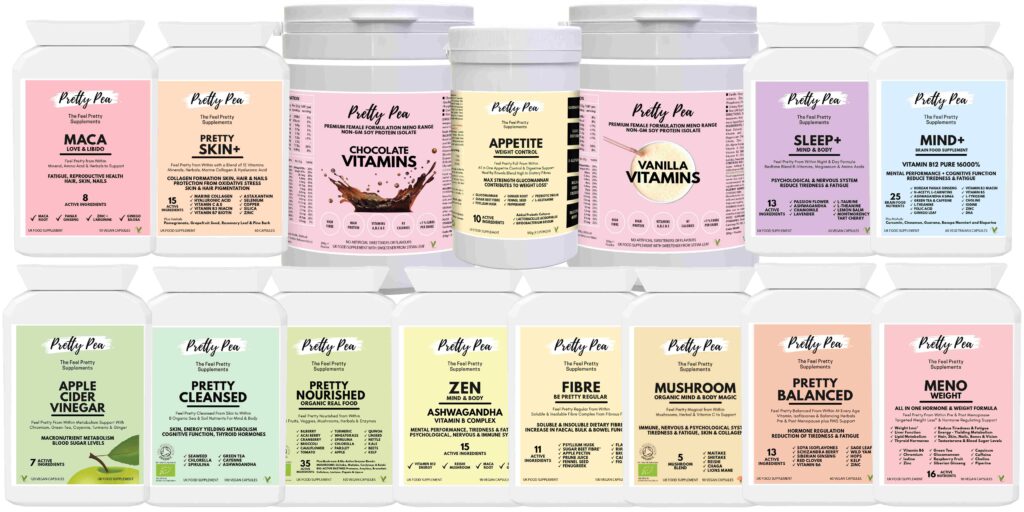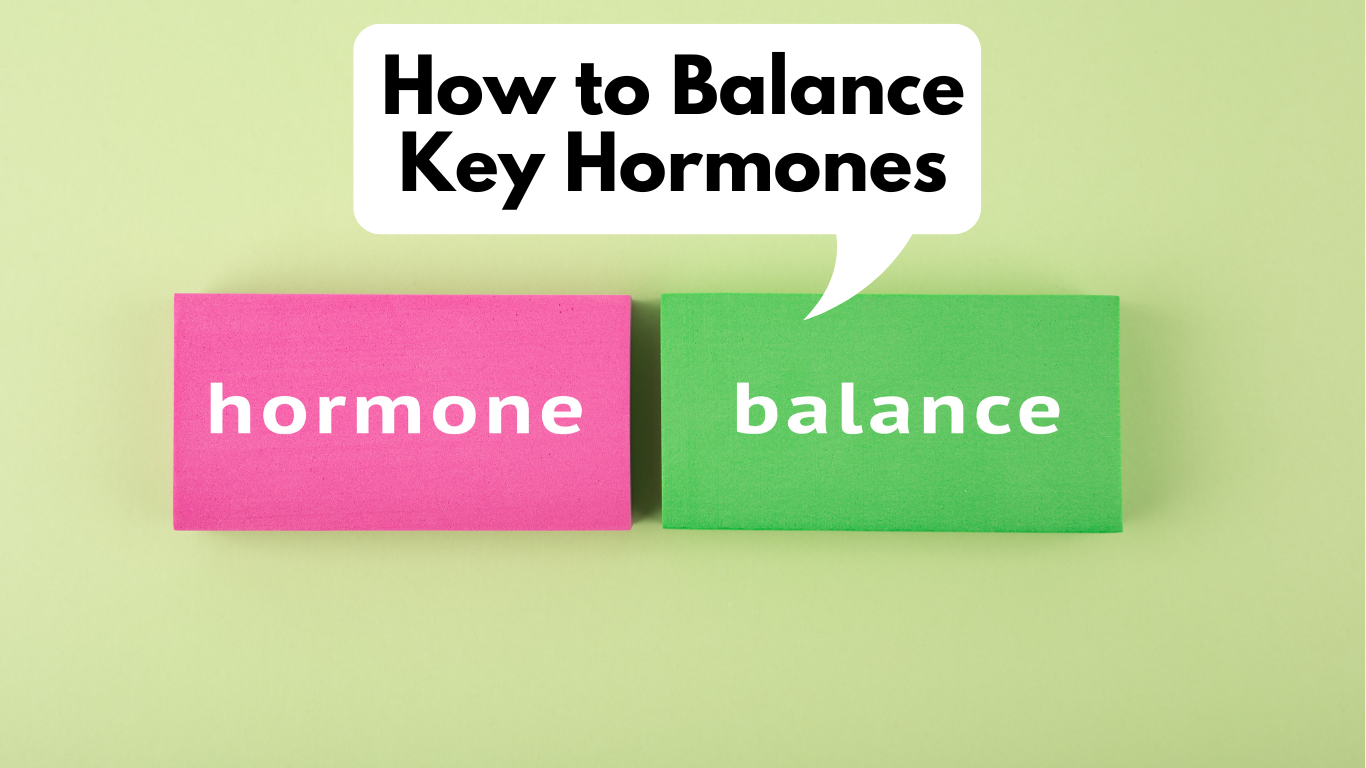Understanding Womens Key Hormones for Hormone Harmony
| Let’s talk hormones. We hear about keeping our hormones in balance – but what are these hormones and how does they really affect you? Well hormones are a pretty big deal. They play a crucial role in our body, from mood and motivation, to metabolism and appetite to reproductive health and healthy skin, hormones are key to how we look and feel on a daily basis. Low and fluctuating hormone levels really can cause chaos in your body. Levels can fluctuate for many reasons, but what is a known for every women is that levels of our sex hormones are going to decline with age. This starts at perimenopause, which can start as early as our late 30’s for some women. We can’t escape this, so it then becomes a case of best management. So here some of the key players women need to know at every age. |
Key Hormones and Their Roles
1. Estrogen
– **Role:** Estrogen is primarily responsible for the development of female secondary sexual characteristics, such as breasts and hips. It regulates the menstrual cycle, maintains the reproductive system, and influences bone density, skin health, and cardiovascular function.
– **Management:** To maintain healthy estrogen levels, include phytoestrogen-rich foods in your diet, such as soy products, flaxseeds, and legumes. Regular exercise and maintaining a healthy weight also support balanced estrogen levels. Avoiding excessive alcohol and managing stress are crucial, as these can disrupt estrogen balance.
**Supplement Fix** Pretty Balanced is phytoestrogen rich combining Soya Isolflavones, Red Clover, Sage, Hops, Wild Yam and many more hormone balance herbals. For delicious soy protein check out Pretty Pea Vitamin packed Proteins powders
2. Progesterone
– **Role:** Progesterone prepares the body for pregnancy and supports it after conception. It regulates the menstrual cycle and maintains the early stages of pregnancy. It also influences mood and sleep patterns.
– **Management:** Ensuring adequate intake of vitamin B6, magnesium, and zinc can support progesterone production. Stress management techniques like yoga and meditation can help, as stress can lower progesterone levels. A balanced diet and regular exercise also contribute to hormone harmony.
**Supplement Fix**– Pretty Balanced (as above) also combines high strength Vitamin B6 and Zinc.
3. Testosterone
– **Role:** Although typically associated with men, testosterone is also essential for women. It contributes to desire, muscle mass, and bone strength. It also plays a role in energy levels, motivation and mood regulation.
– **Management:** A diet rich in healthy fats, including avocados, nuts, and seeds, can support testosterone production. Strength training exercises are beneficial for maintaining muscle mass and overall testosterone levels. Avoiding chronic stress and ensuring adequate sleep are also important.
**Supplement Fix** – Ensure you’re giving your body enough protein to build muscle, for optimum results aim for around 1.6g per kg of your bodyweight each day. Supplement with Pretty Pea Protein to top up your dietary intake. Also check out Pretty Pea’s Maca supplement.
4. Thyroid Hormones (T3 and T4)
– **Role:** Thyroid hormones regulate metabolism, energy levels, and body temperature. They influence heart rate, digestive function, and brain development.
– **Management:** Adequate iodine intake is crucial for thyroid health and many can people can be deficient, so include iodized salt, seafood, and dairy products in your diet. Selenium and zinc are also important, found in nuts, seeds, and whole grains. Regular exercise and managing stress support thyroid function. Avoiding excessive consumption of goitrogens (found in soy and cruciferous vegetables) can be helpful for those with thyroid issues.
**Supplement Fix**- Pretty Cleansed is packed full of nutrient dense seaweed – one of nature’s richest sources of iodine.
5. Cortisol
– **Role:** Known as the “stress hormone,” cortisol helps the body respond to stress. It also plays a role in metabolism, inflammation regulation, and blood sugar levels. Chronic elevated levels can contribute to the accumulation of belly fat.
– **Management:** Stress reduction techniques, such as mindfulness, meditation, and regular physical activity, can help maintain healthy cortisol levels. Ensuring adequate sleep and maintaining a balanced diet, rich in whole foods and low in processed sugars, are also beneficial.
**Supplement Fix**- Pretty Pea ZEN is packed full of nature’s best stress busting herbals including powerhouse Ashwagandha, used in the East for thousands of years.
6. Insulin
– **Role:** Insulin regulates blood sugar levels by facilitating the uptake of glucose into cells. It is crucial for energy production and metabolic balance.
– **Management:** A diet low in refined carbohydrates and sugars, and high in fibre, can help maintain stable insulin levels. Regular physical activity enhances insulin sensitivity. Monitoring portion sizes and eating balanced meals with a good mix of protein, healthy fats, and complex carbohydrates is key.
**Supplement Fix**- Pretty Pea ‘s weight loss supplements Apple Cider Vinegar and Meno Weight and Green Coffee Bean all have important nutrient Chromium to support the maintenance of normal blood glucose levels.
7. Leptin
– **Role:** Leptin, often called the “satiety hormone,” is produced by fat cells and helps regulate energy balance by inhibiting hunger. It communicates with the brain to signal when the body has enough fat stored and reduces appetite.
– **Management:** Eating a balanced diet that includes plenty of fibre and protein can help maintain leptin sensitivity. Regular exercise and adequate sleep are also important, as sleep deprivation can lead to leptin resistance. Avoiding highly processed foods and excessive sugar intake can help support healthy leptin levels .
**Supplement Fix**- Most women don’t consume the recommended 30g of fibre each day, if that’s you check out Pretty Pea’s fab fibre capsules – they contain both soluble and insoluble fibre rich veggies such as Psyllium Husk, Broccoli, Figs, Rhubarb, Prunes and many more.
8. Ghrelin
– **Role:** Ghrelin, known as the “hunger hormone,” stimulates appetite and promotes fat storage. It is produced in the stomach and signals the brain to increase hunger when the stomach is empty.
– **Management:** Eating regular, balanced meals can help regulate ghrelin levels. Foods that are high in protein and fibre can increase satiety and reduce ghrelin secretion. Adequate sleep is crucial, as sleep deprivation can increase ghrelin levels and appetite .
**Supplement Fix**- Pretty Pea’s Appetite weight loss powder is fibre packed and will leave you feeling naturally full. This prebiotic and probiotic blend naturally swells in your stomach promoting the feeling of fullness.
9. Adiponectin
– **Role:** Adiponectin is a hormone produced by fat cells that regulates glucose levels and fatty acid breakdown. It enhances insulin sensitivity and has anti-inflammatory properties.
– **Management:** Regular physical activity and maintaining a healthy weight are key to promoting adiponectin production. A diet rich in monounsaturated fats, such as those found in olive oil and nuts, and omega-3 fatty acids, found in fish and flaxseeds, can support healthy adiponectin levels. Avoiding trans fats and excessive refined sugars is also beneficial.
Tips for Managing Hormone Harmony
1. **Nutrition:** Eating a balanced diet rich in whole foods, including plenty of fruits, vegetables, lean proteins, and healthy fats, supports overall hormone harmony. Avoid excessive sugar, processed foods, and unhealthy fats.
2. **Exercise:** Regular physical activity helps regulate hormone imbalances. Aim for a mix of cardiovascular exercises, strength training, and flexibility exercises like yoga or Pilates.
3. **Stress Management:** Chronic stress can wreak havoc on hormone balance. Incorporate stress-reducing activities into your routine, such as meditation, deep breathing exercises, and hobbies that you enjoy.
4. **Sleep:** Adequate sleep is essential for hormone balance. Aim for 7-9 hours of quality sleep per night and maintain a consistent sleep schedule. Make getting good sleep a top priority.
5. **Hydration:** Drinking enough water is crucial for all bodily functions, including hormone production and regulation. Aim for at least 8 glasses of water a day.
6. **Avoid Toxins:** Limit exposure to environmental toxins that can disrupt hormone harmony, such as certain plastics, pesticides, and chemicals found in personal care products. Opt for natural and organic products when possible.
7. **Regular Check-Ups:** Regular medical check-ups can help monitor hormone balance and identify any hormone imbalance early. Work with your healthcare provider to address any concerns and develop a plan for maintaining hormone harmony.
Conclusion
Understanding the roles of different hormones and how to manage them is essential for women’s health. By adopting a healthy lifestyle that includes balanced nutrition, regular exercise, stress management, and adequate sleep, women can support their hormonal health and overall well-being. If you have concerns about your hormone imbalances, consult with a healthcare professional to get personalized advice and treatment options.
Supplements are not intended to replace a healthy diet and lifestyle. They are there to supplement and fill any gaps to support being at your very best.

References
1. “Leptin and its role in obesity and related diseases,” National Center for Biotechnology Information. [NCBI](https://www.ncbi.nlm.nih.gov/pmc/articles/PMC5350852/)
2. “Ghrelin: much more than a hunger hormone,” National Center for Biotechnology Information. [NCBI](https://www.ncbi.nlm.nih.gov/pmc/articles/PMC4493625/)
3. “Adiponectin: an adipokine regulating glucose and lipid metabolism,” National Center for Biotechnology Information. [NCBI](https://www.ncbi.nlm.nih.gov/pmc/articles/PMC3350807/)
4. “Adiponectin: Role in Metabolic and Cardiovascular Disease,” National Center for Biotechnology Information. [NCBI](https://www.ncbi.nlm.nih.gov/pmc/articles/PMC3910425/)

